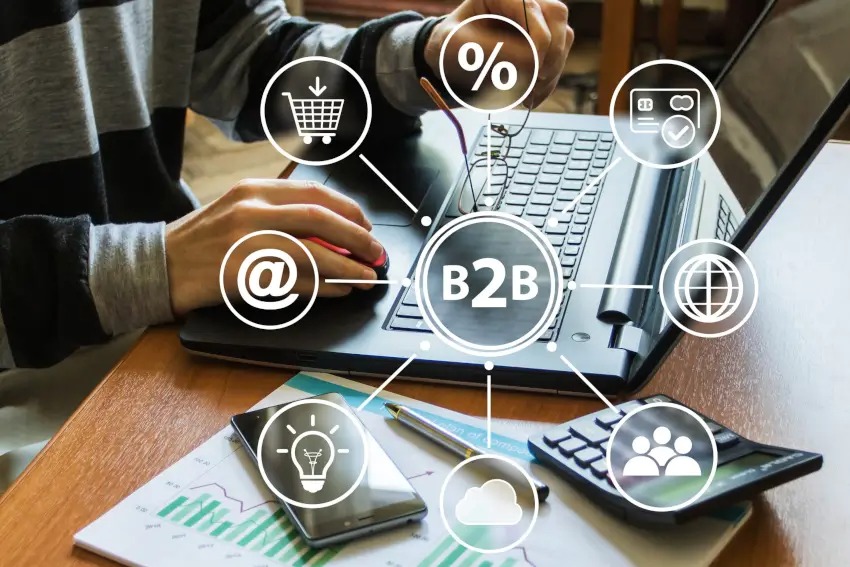12 Essential Features for a Successful B2B e-Commerce Store

As more B2B companies move online, having a successful e-commerce store is becoming more and more important.
B2B buyers have different needs than B2C buyers. E-commerce stores designed for B2B transactions need to take these needs into account.
If you're making this move yourself, you'll need to be aware of a number of essential features that a B2B e-commerce store should have. These features are critical to ensuring a successful e-commerce store for B2B transactions.
It doesn't matter whether you're getting started or looking to optimise your existing e-commerce store. These tips will help you improve the buyer experience and drive sales growth.
Read on and we'll walk you through what you need to know.
1. User-Friendly Interface and Navigation
The user interface and navigation of a B2B e-commerce store should be intuitive and user-friendly.
This means that the layout of the website should be clean, simple, and uncluttered. Navigation should be logical, with easy-to-use menus, search bars, and filters.
The user interface should also be responsive. This means that it can adapt to different screen sizes, including desktops, tablets, and mobile devices.
This is crucial since many B2B buyers use mobile devices to place orders.
To ensure the website's user interface is responsive, it's a good idea to involve users in the design process. Conduct user testing to get feedback on the website's usability, and adjust the design based on the results.
2. Robust Product Catalogue
A robust product catalogue is essential for any B2B e-commerce store. The product catalogue should be well-organised. That means easy-to-find products that have clear descriptions, images, and pricing information.
The product catalogue should also have a flexible structure that can accommodate different product types, categories, and variations. It should also allow users to filter products based on different criteria such as price range, size, colour, or availability.
To keep the product catalogue up-to-date, it's important to have a system in place that allows for easy product updates, additions, and removals.
This system can integrate with the company's ERP or CRM system to ensure that inventory data is up-to-date.
3. Advanced Search Capabilities
Advanced search capabilities are crucial for B2B e-commerce stores. B2B buyers often have specific product requirements and need to find products fast.
Advanced search capabilities should include features such as filtering and autocomplete. They could also make product suggestions. The search bar should be easy to access and visible from all pages of the website.
Filters allow users to narrow down their search results based on specific criteria. This could include criteria such as product category, price range, or availability. Faceted search is a feature that can be helpful as well.
A faceted search feature would allow users to refine their search results by selecting multiple criteria at once. Autocomplete and product suggestions help users find products quickly.
4. Personalised Pricing and Discounts
B2B buyers can expect personalised pricing and discounts based on their order history. The e-commerce store should have the capability to offer personalised pricing and discounts. This can all come from the buyer's history, location, and other relevant factors.
To ensure accurate pricing, the e-commerce store should integrate with the company's pricing system. This system takes into account factors such as volume discounts and special promotions.
The e-commerce store should also allow buyers to request a quote for large orders. This feature can help with large negotiations and bulk purchasing.
5. Efficient Checkout Process
The checkout process should be efficient and easy to use. B2B buyers often place large orders, so the checkout process should be ready to handle large order volumes - and quickly!
Consumer expectations for checkout get tougher every year. The fastest companies come out on top.
For this reason? The checkout process needs streamlining, with as few steps involved as possible.
It should also integrate with the e-commerce store's inventory management system. This way, you can ensure that products are available and ready to ship.
To make the checkout process more efficient, consider offering guest checkout. You could also allow buyers to save their shopping cart and integrate the cart with popular payment gateways.
6. Multiple Payment Options
B2B buyers often have specific payment requirements. Your e-commerce store should offer varied payment options to accommodate these requirements.
Payment options should include credit card payments, wire transfers, and other payment methods. The payment gateway should be secure, with encryption and fraud detection features.
To ensure smooth processing, the e-commerce store should integrate with your accounting system. This will help to facilitate invoicing and payment reconciliation.
Explore More with DWS
7. Integration with CRM and ERP Systems
The B2B e-commerce store should be integrated with the company's CRM and ERP systems to ensure that orders, customer data, and inventory data are all synced up.
This is another essential way to streamline the overall online shopping experience.
Integration with the CRM system can help to personalise the customer experience, track customer interactions, and automate customer communications.
Integration with the ERP system can help to manage inventory levels, streamline the order fulfilment process, and ensure accurate pricing.
8. Customizable Order Management System
A customizable order management system is crucial for B2B e-commerce stores. The order management system should be flexible enough to accommodate different order types, such as standard orders, custom orders, and recurring orders.
The order management system should also allow for easy order tracking, with real-time updates on order status and shipping information.
To ensure efficient order fulfilment, the order management system should be integrated with the company's inventory management system, shipping carriers, and other fulfilment partners.
9. Reliable and Secure Hosting
Reliable and secure hosting is essential for B2B e-commerce stores. The website should be hosted on a secure server with SSL encryption, firewalls, and other security features.
The hosting provider should also offer reliable uptime and fast load times to ensure that the website is accessible and responsive to buyers.
It's also important to have a backup system in place to ensure that data is not lost in the event of a server failure or other technical issues.
10. Excellent Customer Support
Excellent customer support is critical for any kind of online store. Buyers often have complex product requirements and need prompt and knowledgeable assistance.
The e-commerce store should offer multiple channels for customer support, including phone, email, and live chat. The customer support team you have should be trained to provide prompt and helpful assistance to buyers.
Additionally, the e-commerce store should have a robust knowledge base and FAQ section to help buyers find answers to their questions quickly and efficiently.
The better you're able to provide for the customer online, the better you can build a relationship with them.
11. SEO Optimisation
Search engine optimisation (SEO) is crucial for B2B e-commerce stores. You need to ensure that the e-commerce website appears at the top of search engine results pages (SERPs). This is where most buyers will be searching for products or services.
You don't want to miss them!
The e-commerce store should come with SEO best practises in mind. This means using relevant keywords in product descriptions and titles and optimising page load times.
Additionally, the store should have a sitemap and a robots.txt file to help search engines crawl and index the website more efficiently.
By optimising the e-commerce store for SEO, B2B companies can increase their visibility and reach more potential buyers. More traffic means more sales, and that's the bottom line here.
12. Strong Sales Funnel
A strong sales funnel is essential for B2B e-commerce stores to guide buyers through the purchasing process.
The sales funnel should capture leads, nurture them with targeted content, and move them toward a purchase decision.
One way to do this is to offer free resources, such as e-books or white papers. These assets provide valuable information to buyers and position the company as a thought leader in the industry.
The sales funnel should also include clear calls to action (CTAs) at each stage. Encouraging buyers to take the next step toward making a purchase is an important move to make.
By optimising the sales funnel, B2B e-commerce stores can build trust with potential buyers and increase conversions. This all contributes to growing revenue and a growing business.
Features for a Successful B2B E-Commerce Store
Running a successful B2B e-commerce store means providing the best possible experience for your customers and for yourself. The better your system is set up, the smoother your operations will run, and the better sales results you're likely to bring in.
The above are all features important to prioritise if you want your online store to be a success. If you know what's needed for your online store, you can work with a provider to ensure you get exactly that.
With these essential features, a B2B e-commerce store can drive sales and your overall revenue growth.
Need help building the perfect e-commerce site for your business? Give us a call anytime for more help.
Related Posts
See how our digital solutions have helped businesses like yours move forward with confidence. Don’t just take our word for it, hear directly from the clients who’ve experienced the difference.
"Having successfully worked on a previous project with DWS, we were happy to partner with them again for our e-commerce transformation. From the outset, DWS demonstrated a keen understanding of our unique requirements and challenges. Their expertise in Adobe Commerce, combined with a truly collaborative approa...
"Partnering with DWS has been a massive asset to Vohkus, providing us with development expertise, training and DevOps for Magento 2. From the outset it was evident that they had multiple developers each capable of handling many of the complex requirements we could not complete ourselves. Their commitment to tr...
"Have been working with Lee from DWS for number of years. Lee has an unrivalled knowledge of all things Magento. During our migration from Magento 1 to Magento 2, he helped to shape the design and build of the new platform, and his expertise was instrumental to the success of the project. As well as offering o...
Ready to start or take your e-commerce to the next level? Every step forward matters, and we’re here to help you make it count. Get in touch with DWS to see how we can turn your digital goals into reality. Let’s shape and grow your e-commerce journey... together.





